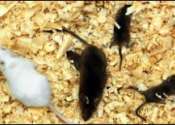Brain makes its own version of Valium, researchers find
Researchers at the Stanford University School of Medicine have found that a naturally occurring protein secreted only in discrete areas of the mammalian brain may act as a Valium-like brake on certain types of epileptic seizures.
May 30, 2013
0
0




